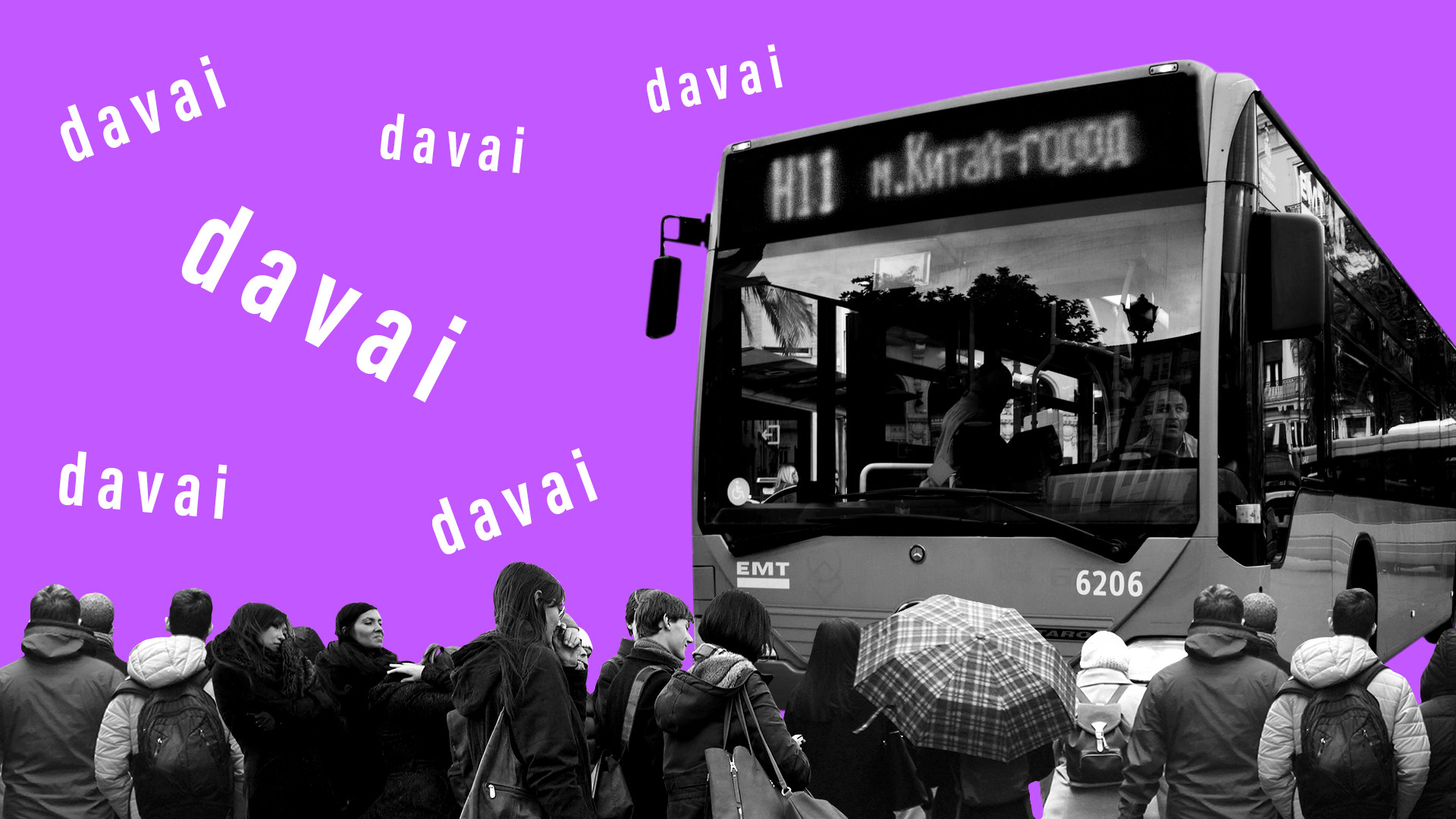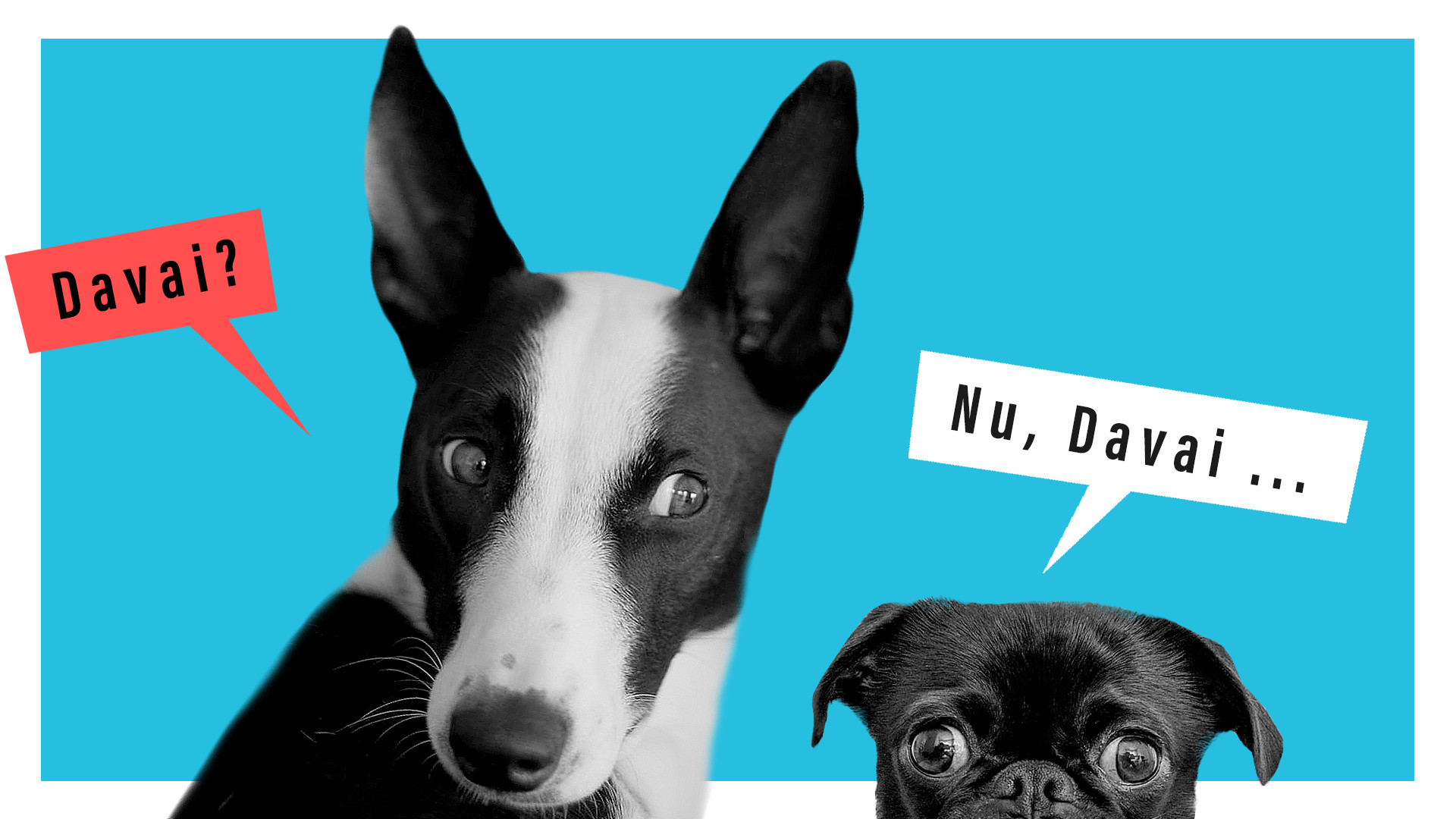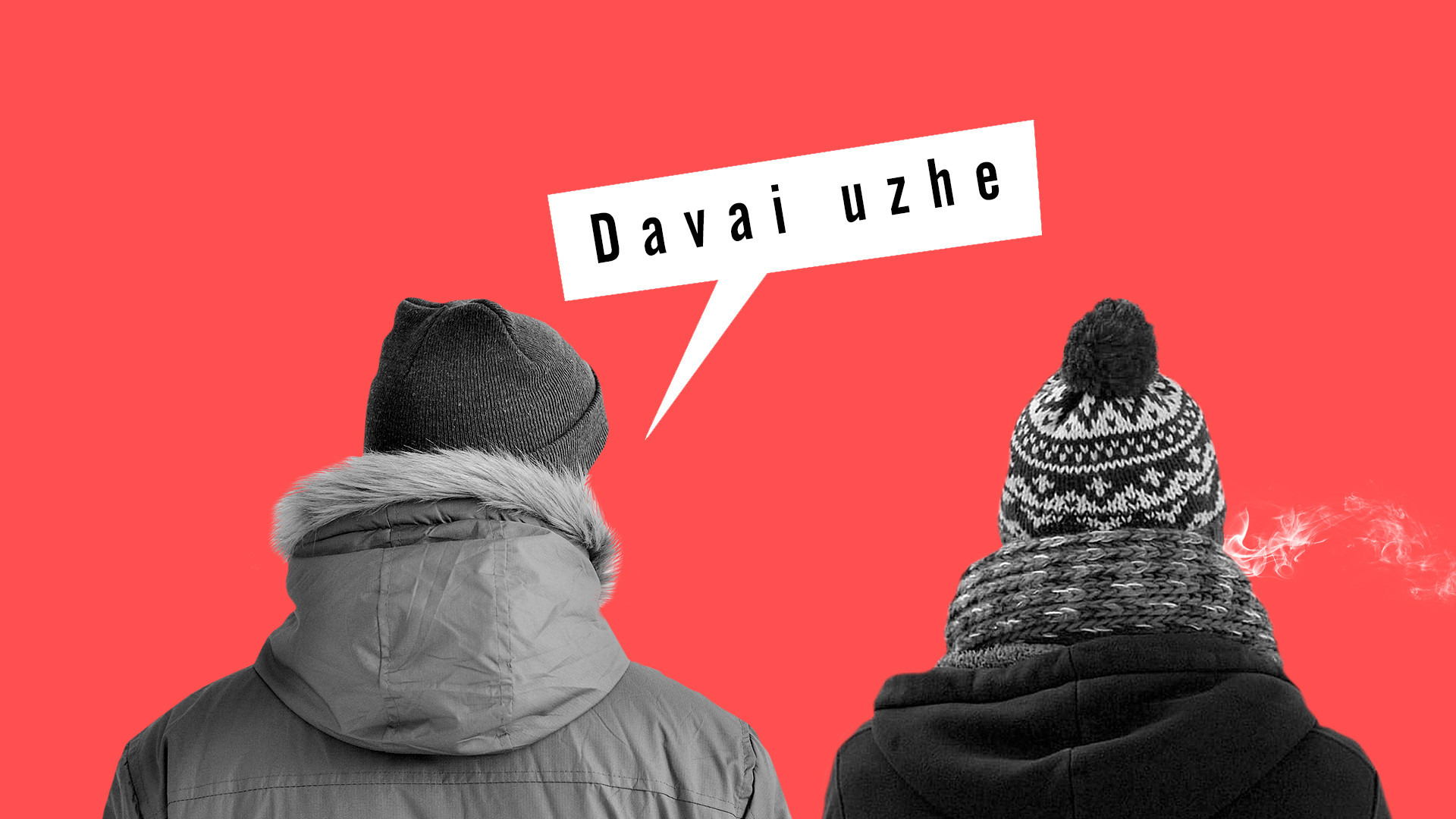I worked at a children’s camp for a bit in 2018. There was a Russian version of one of those children’s toys in the back of the room that tells you the sound animals make: the cow goes moo, the chicken goes cluck, the cat goes meow, and so on. I picked it up and gave it a spin while the Russian teacher gave kids directions on the assignment they had to do. “The cow goes davai!” “The cat goes davai!” “The chicken goes davai! Poka Poka!” I stopped, looked around. I heard it again, “DAVAI.”
I followed the sound and to the head of the room. It turned out the toy was broken and what I was hearing was the teacher directing the students on how to complete the assignment. She told them to do this, get that, hurry up, then told one to go sit somewhere else, and said goodbye to another student whose mother came to pick him up. Each time, she said, “davai, davai, davai, davai.”
These are only a few of the ways you can use the word “davai.” It is one of the most versatile words I have heard in any language and it is the schizophrenic Crown Prince of Context. (“F*ck”, the king of context, is not dead yet.)
It is such a versatile word that there is a good chance you’ll use it right, but an equally good chance you’ll have no idea what you just said. For example, if you walked into Russia at any time of day, stepped into any conversation, waited a moment, and then said “davai,” any number of things might happen: they might hand you a cigarette, ask where you expect them to follow you to, appreciate you for agreeing to the excellent point they just made, or reciprocate the “davai” and walk off.
For Russians, “davai” is natural — no matter how it is used, Russians seem to understand exactly what each other means. It is like a pervasive linguistic magic trick that outsiders will need to spend a lifetime mastering.
Since Davai has so much to do with context, I thought it would be best to examine how it is used based on where you are rather than what you’re doing.
In the bedroom
According to Nadja, a Saint Petersburg resident, “come on” is the most common usage of the word ‘Davai’. As well, she says, “Besides other meanings, давать in Russian can mean “to let someone have sex with you”, which implies the person who “lets” is being unenthusiastic/passive/uninterested in the process.”
“So,” I asked, “like if someone were to be like, ‘C’moooon let’s have sex,’ to someone who just wants to go to bed, that other person might say, ‘Da, davai.’ as in ‘alright, let’s do it so I can sleep.’?”
Nadja, thought for a moment, and told me, “Wow, actually as you put it here, this ‘da, davai” can sound pretty enthusiastic too.” Then added, “Damn this Russian language is so complicated.”
There is no truer statement; if the new alphabet doesn’t scare foreigners off, and they master the noun cases, Russian still has its last line of defense: ‘davai’. This little word could be used throughout the whole playful process of a couple’s evening:
“Come on! Let’s have sex.”
“Sigh, da davai…”
As things progress and the person becomes more interested, no longer sleepy, they might say, “Ooo, DA, davai!”
If we give that situation some privacy for a moment, it isn’t the only time davai might be used in the bedroom. For example, the next morning, Nadja tells me, the person who woke up first, might go make breakfast, come back and say, “Nu davai vstavai uzhe, pora prosypat’sya» (“Ну давай вставай уже, пора просыпаться.” – Come on, get up) then they might say, “Breakfast is getting cold, davai idi esh’ (“давай иди ешь” — come on go eat”).
When used as “Come on”, davai is often followed up with an action verb of some sort to indicate literally anything you might want them to do. In this way, you might find davai – when its solo usage is too abrupt to be understood – being clarified. Yet, when davai is pulled out, you should always be on guard for context since Russians will often understand perfectly well, leaving you to drown in the sea of ambiguous ‘davai’s.
In a bar
Davai comes from the verb davat (давать) which means “to give.”
Say you’re with a friend and he says, “Давай по пивку” (let’s get a beer.”) So, you find yourself in a bar. You finish the first and ask your friend if he wants another round and he says, “Davai.” But first, he wants a cigarette so he stands and says, “First let’s have a cigarette, davai, outside,” and, once you’re outside, your friend realizes they forgot their cigarettes. “Can I have one? They ask. “Sure,» you say. Then, as you take out your pack, you’re suddenly distracted by a flock of seagulls squawking as they fly overhead. “DAVAI, DAVAI, DAVAI!” You hear them say, echoing through the alleyway. When you turn back to your friend you realize that they, too, are saying “davai,» motioning to the pack in your hand. “Davai, they say as in: Hurry up, man—it’s cold out here. You come to your senses and pass one over…
You finish your cigarettes in silence. Your friend finishes first, you’re taking forever and he wants to go inside so he says, “davai uzhe” (“давай уже”, go already) waving at your cigarette. “Hurry up” is what he means, but you decide this friend is kind of a rude guy. So, you tell him that on second thought you’re going to head home and so he shrugs and says, “vsyo, davai, poka» (Alright then, goodbye / всё, давай, пока).
That’s the thing about davai – it is a word like a rude little brother. It is always shoving itself in between other words, rarely caring if anyone wants him there or if it’s an appropriate time. Other words put up with him because words are mouth prisoners and they have no choice in the matter.
On the phone
You leave the bar, and as you’re walking along, you hear something from behind you. That can’t possibly be another person saying “davai,” you think. And yet, it is.
Mike Cactus, a Moscow resident says he mostly uses it to make someone in front of him move faster, or as a casual form of encouragement. So, if you’re walking, you get a phone call, and slow down to pick it up, someone behind you might say, “davai-davai-davai!” to get you to speed up. Which is far kinder than in Moscow’s American sister city, New York, where you’ll mostly get a, “Hey buddy, get the f*ck out of my way!”
Once on the phone, you might tell the person you’ve got some juicy gossip (though I rarely run into Russians as fond of gossip as Americans) and the person might say, “nu davai” to mean, “come on, spit it ou” and you start to tell them the story but then they start shouting at their television “DAVAI! DAVAI! DAVAI!”
Their favorite football team is playing and they’re cheering on their star player who was taking the ball up the field to score.
“I’m so tired of this freaking word!” You yell into the phone.
And your friend says, “What word?”
“Davai! Man, Davai! I can’t take it anymore.”
And your friend, assuming you’re saying goodbye to him also says, “davai,” then hangs up.
And then your brain explodes.
If using any of Russia Beyond’s content, partly or in full, always provide an active hyperlink to the original material.
Get the week’s best stories straight to your inbox
Ну давай, ага, давай, ну ладно, давай!(Ok let it be, ok, ok, ok bye”)
There is the word “Давай” in Russian language. Actually, this is the verb ДАВАТЬ in imperative mood. So, the plural imperative form is ДАВАЙТЕ. Давай and Давайте. Let’s consider the meanings of this word:
Давай! – it can mean “bye!”, just a quick “bye”, usually in end of phone conversation.
Давай also has its literal meaning – give!
Давай! can mean “go ahead!”
The phrase “да, давай” can also mean “let’s do it” or “let it be”
In context it can mean “let us(let’s)”, for example: ДАВАЙ СДЕЛАЕМ – let’s make/do.
And also Давай in some context can mean “okay let’s go”, for example “Давай поедем на дачу? Давай!” – let’s go to the country house? okay let’s go!
A few examples of when to use one of the most popular Russian words
Russians use the word давай when they want to do something together, when they agree with each other, when they say goodbye and even when they drink alcohol. It is quite confusing, isn’t it? It seems that now it is high time to go through some examples and to get rid of this mess in your head.
First of all, we say дай/давай as an Imperative, in the meaning of giving something
- Дай мне мой телефон, пожалуйста. Give me my phone, please.
- Давай мне деньги, и я заплачу за билет на поезд. Give me money and I will pay for the train ticket.
If you meet your friends and you want to say goodbye, you will definitely say пока, до свидания or давай(те)
- Давай, до завтра! See you tomorrow!
- Давай, скоро увидимся! See you soon!
- Давай, пока! Bye!
There is also possible to use давай in the phone call when you want to finish the conversation. It is implied that a person says давай (закончим), I would like to finish it: «Ну всё, мне пора идти, давай. Well, it’s time to go. Bye!» or «Мой сын спит, не могу говорить. Давай. My son is sleeping, I can’t talk now. Bye!»
Давай can be said in the meaning of let’s when you offer to do something together. After давай an infinitive in perfective or imperfective form should follow:— Давай сходим в кино! Let’s go to the cinema! Давай делать домашнюю работу вместе? Would you like to do the homework together?
— Давай сначала приготовим ужин, а потом пригласим гостей. Let’s cook a dinner first and then invite guests.
— Давай поженимся! Let’s get married! (This is the title of one Russian famous TV show)
If you are a football/basketball/volleyball/biathlon/tennis fan (underline as applicable), you can cheer your favorite team or a sportsman shouting давай-давай! It means that you want to support someone or encourage to perform better. Perhaps, the best example is the song which is usually sung by the Russian spectators in the Olympic Games:
Давай Россия,
Давай, давай,
Давай красиво,
Давай, давай!
Hi everyone! Today I am going to tell you about a word that Russians love as their own mothers but totally hate when they hear foreigners saying it. That is the word «давай». However the good news is that unlike 91% of Russian words, davai in Russian doesn’t change its form and stays the same regardless of a pronoun, nouns’ gender, verb tense or internal politics.
Actually, the word davai in Russian has several meanings. The most common is ‘let’s’ or ‘let us’. Here are some examples for you.
1. «Давай выпьем чего-нибудь?» — ‘Let’s have a drink, shall we?’ («выпьем» is a future form of ‘to have a drink’ used with a pronoun ‘we’ – we will drink).
2. «Давайте соберёмся и обсудим» — “Let’s gather together and have a discussion’ («Соберёмся» is a future form of «собираться» ‘to gather’ used with a pronoun ‘we’ and «обсудим» is a future form of «обсуждать» ‘to discuss’ also used with a pronoun ‘we’).
When somebody is proposing doing something and says «Давай» or «Давайте» (the second one is for addressing a group of people), the usual answer to that is «Давай» or «Давайте». Which can be roughly translated as ‘sure’. Handling davai in Russian is easy and you won’t find it difficult to remember.
There is another expression with davai in Russian – «давай-давай». It generally means the same as a single «давай», but is not used that often and has a slightly different meaning. Davai — davai in Russian is an urge to a more active, energetic or quicker action. «Давай-давай!» is what you always hear at discos or karaoke or sport competitions. It’s kind of ‘Come on!’ It means ‘let’s move, guys!’ or ‘Let’s have fun!’ or ‘Let’s get this party started!’
When Russians are watching sport competitions it sounds like Davai is the only Russian word they know.
But Russians are unlucky enough to hear davai in Russian (mostly in terrible Russian) whenever they visit touristy places abroad. Just imagine: a Russian is on a vacation, he is relaxed and at this very moment is enjoying his little peaceful walk along the street. And then suddenly «Давай-давай!» wildly interrupts this tranquility. ‘Hey Russian, quickly move your butt over here! I have something for you to buy’ that’s what Russian hear behind «давай-давай!».
‘Ugh! Gosh, let’s get out of here asap!’ So if you know someone working for the tourist industry, tell them not to address Russians in the street with «Давай-давай!» At least they won’t get a rude response in Russian as a reply, which one day we will also learn.
Давай-давай, don’t forget to subscribe!
Free Russian audio lessons online: words, pronunciation, texts. Davai in Russian. We love to say it, but you’d better not
r/russian
This is a subreddit for people looking to learn Russian and all things related to the Russian language. Though Russian is encouraged, most discussions are in English.
—
Это сообщество для людей, изучающих русский язык, и для обсуждения всего, что с ним связано. Использование русского приветствуется, но обсуждения чаще всего ведутся на английском.
—
Copy/paste ⓇⓊ to replace ru in URLs to avoid shadow deletion.
Members
Online
4 meaning of the word давай #learning #grammar #russian #short # #learninglanguages #video #languageПодробнее
Learn RUSSIAN in 4 minutes: use THIS WORD to sound like a NATIVEПодробнее
Давай знакомиться!!! Я млм предприниматель. А кто ты?Подробнее
5 meanings of the Russian word ДАВАЙ #ShortsПодробнее
How Vauxhall became the Russian word for Train Station! | Как Vauxhall стал названием для вокзала!Подробнее
IMPORTANT Words and Phrases for a Conversation in Russian / БЫТЬ, ЕСТЬ, ДАВАЙ etc. | Lesson 50Подробнее
Tricky Russian word ДАВАЙ | 10 ways to use ДАВАЙ in RussianПодробнее
Guess the word \ Russian conversationПодробнее
The usage of the word «давай» in Russian.Подробнее
ДАВАЙ / meanings of the popular Russian wordПодробнее
Intermediate Russian: ДАВАЙ(ТЕ): Suggestions & Invitations with LET’SПодробнее
Актуальное
Learn Russian in
the fastest,
easiest and
most fun way
Want to Start Learning Russian in Just a Minute a Day? Get the
Russian Word of the Day — Free Daily Vocab Lessons
You Have Added Word of the Day to Your Account
You’ve always wanted to learn Russian, right? The easiest
way to start — this takes just a minute a day — is with RussianPod101’s
Word of the Day. Perfect for complete beginners and anyone that wants to learn more
Russian words. How does it work?
- Just Sign Up & Get Your FREE Daily Russian Lessons
- Learn in Just a Minute — Just check and review the
email - Learn Anywhere, Anytime — Wherever
you have email access
- Master the Word with the meaning, native audio
pronunciation and picture - Access Extra Sample Sentences — understand how it’s
used - And Stay on Track — Lessons are
sent to you non-stop, every day
Want to Learn Even More Russian?
Free Lifetime Account

Sign up for your Free Lifetime Account and unlock 6
powerful learning tools. They’re yours to keep forever.
100 Must-Know Words

You’ll learn the 100 must-know Russian words, from reading
and speaking to perfecting your pronunciation.
Free Vocabulary List

Access any vocabulary list for free! And review with
definitions, sample sentences and audio pronunciation.
Audio & Video Lessons

Learn Russian with our effective audio and video lessons
from real native teachers at RussianPod101.
Free Russian App

Learn language anywhere, anytime! Download the Innovative Language
101 App for iPhone, iPad & Android.
Free Audio Dictionary

Have you come across any Russian word you don’t know?
Look it up in the RussianPod101 dictionary!

















